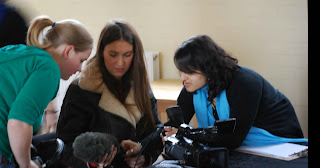
- Technical - Having continuous contact with technical equipment such as the Sony Z1HD camera and sound recording devices meant that I was able to pick up techniques of setting up and operating them efficiently. I was able to learn new features and functions by experimenting with the equipment.
- Organisation - In order to ensure all the aspects of the shoot ran smoothly it was important to ensure the crew was aware of the schedule, the correct equipment was booked and hired for the appropriate day and the client was aware of what would be happening. This encouraged me to think laterally about all the influential factors.
- Communication - I was required to communicate effectively by e-mail and in person throughout the production stage. It was crucial to be accurate in all the information that I was conveying as this affected the shoot creatively and technically. I picked up techniques where I paid extra attention to detail such as shoot times, locations, shot lists etc. The process also steered me towards making a standard system that was applicable to all the shoots. For example each call sheet had the same information but was adapted according to the particular shoot. I found that the shoots ran according to schedule as a result of effective communication.
- Professionalism - I attempted to maintain a high level of professionalism with both my client and my crew. This increased my confidence as an independent multimedia practitioner as I was encouraged to act in a fashion that would be accepted in the industry. This includes characteristics such as punctuality, politeness, good presentation, co-operation and subject specific awareness.
- Business Management - Creating a budget, keeping receipts of expenditures and providing invoices all formed part of developing awareness of the business aspects. This made me consider the cost implications of hiring extra equipment, taking extra taxis for transport, providing lunch for the crew members etc. Considering this was a university project, many of my costs were cut, however if this was to be commissioned or paid for I would have to seriously consider how my services (and the crew's services) would be paid for in addition to the overheads etc.
I think the most effective aspect of the production stage was the team of crew members. This ensured that each role was fulfilled with concentration. However I feel I could have improved the quality of the footage by selecting crew members with expertise in certain areas such as sound. A major drawback was the lack of expertise in cinematography and lighting which had a direct impact on the quality of the interviews.
My skills and techniques as a producer and director were tested during this stage of the client project. I believe I have improved on my abilities since the simulated project as I have implemented strategies that were effective and introduced systems that I thought were needed. I have developed in practical experience of audio-visual production.




No comments:
Post a Comment